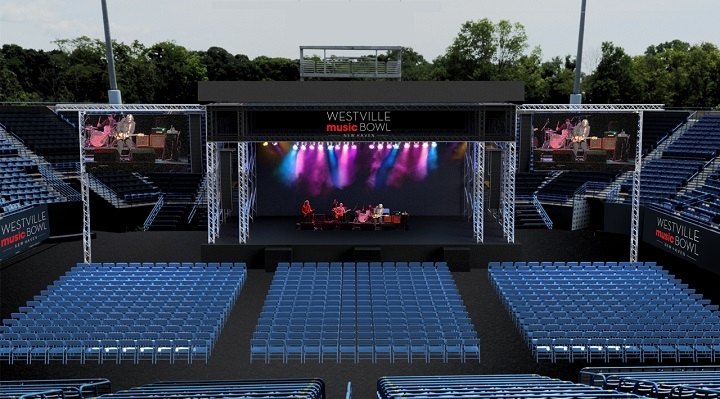
Thomas Breen photo
A sign outside Parking Lot A of the new Westville Music Bowl.

Langan Engineering
The updated traffic and parking plan for the 2021 season.
The operators of a new Westville outdoor-music venue plan to keep Yale Avenue open to through traffic this concert season, as they dramatically scaled back the site’s parking plan to correspond to a Covid-induced capacity cap.
Local attorney Steve Mednick and engineer Tim Onderko presented those no-street-closure plans Wednesday night to the City Plan Commission, which held its latest monthly meeting online via Zoom.
The plans are associated with the Westville Music Bowl, a new outdoor-music venue slated to open this spring at the site of the former tennis stadium at 45 Yale Ave. that’s right across the street from the Yale Bowl.
NHCPA Outdoors LLC, which will run the new site and which is a subsidiary of the nonprofit that owns the College Street Music Hall downtown, recently announced the venue’s first two scheduled shows after keeping the venue dark last year due to the pandemic.
The inaugural shows will be headlined by the jam band Gov’t Mule on the evenings of April 30 and May 1. Other announced shows include Twiddle on May 15, The Disco Biscuits on June 4 and 5, and Pigeons Playing Ping Pong on June 26.

Zoom
Wednesday night’s City Plan Commission virtual meeting.
On Wednesday night, Mednick told the commissioners that, contrary to the venue operators’ intentions last year when they initially won permission for an updated parking plan for the site, they do not plan on closing down any part of Yale Avenue this concert season.
“Yale Avenue is not shown as being closed off and is not going to be an extension of the venue,” Mednick said.
That’s because NHCPA Outdoors LLC has decided to limit its audience sizes at the 12,000-person venue to no more than 2,000 people per show.
Mednick said the lower audience cap will allow the venue to comfortably abide by the state’s Covid-19 safety guidelines around venue capacity and social distancing.
Mednick and Onderko said that the venue operators have subsequently decided not to request that the city shut down parts of Yale Avenue during shows this year.

Thomas Breen pre-pandemic photo
Attorney Mednick (right) with architect Jay Brotman and NHCPA Outdoors LLC head Keith Mahler.
Last year, the site’s operators won permission to close down a part of Yale Avenue between Derby Avenue and Chapel Street to open up car-free road space near the venue for pedestrians and food trucks. Those closures would only take place on the day of an event, as opposed to the weeks-long street closures that took place during the former tennis tournaments.
This year, however, with such a relatively small anticipated crowd size and because of the ongoing pandemic, they said they won’t be asking for any Yale Avenue shutdown.
Instead, they’re working with the city to set up street signs on that stretch of Yale Avenue indicating no parking, no standing, and keep roadway clear of cars. “If someone was taking an Uber or a Lyft, or someone was being dropped off,” they’d use that stretch of Yale Avenue, Onderko said. But cars cannot park on the road.

Langan Engineering
An aerial shot showing the music venue in the bottom right corner.

The 2020 approved parking plan. Only Lots A and H will be used in 2021.
The venue operators will also limit on-site parking to two lots — Lot A, immediately to the north of the venue, and Lot H, off of Chapel Street — rather than using the previously approved five separate parking lots in the area, Mednick and Onderko said. The site also plans to make available handicap-accessible parking in a Yale University lot off of Chapel Street.
“We think this is a good test run to make sure our system works,” Onderko said about the anticipated traffic flow and parking arrangements.
With only 2,000 people at most coming to any given concert, he said, the site could see between 600 and 1,000 cars per show.
“In the grand scheme of traffic on Derby Avenue, that’s a drop in the bucket of the daily traffic that road sees.”
So, Westville Alder and City Plan Commissioner Adam Marchand asked, “No street closures at all?”
“Correct,” Onderko replied.
Mednick said that, depending on how the state’s Covid guidelines change and depending on the state of the pandemic come this spring and summer, the venue operators may consider coming back to request an update to the street closure plan. But that would have to be done six weeks before any closure were to take place. And, where things are now, the venue operators plan on sticking with the scaled back setup.

Contributed image
Digital rendering of the planned new venue.
City Plan staffer Anne Hartjen said that her office plans to issue an administrative approval for the parking and no-street-closure plan.
The underlying planned development district (PDD) that governed the former tennis stadium’s operations since the site’s construction 30 years ago required the building’s operators to come to the City Plan Commission every year to get permission for street closure plans.
With no street closure requested this year, Hartjen said, the commissioners did not have to vote, and she would issue the approval herself.